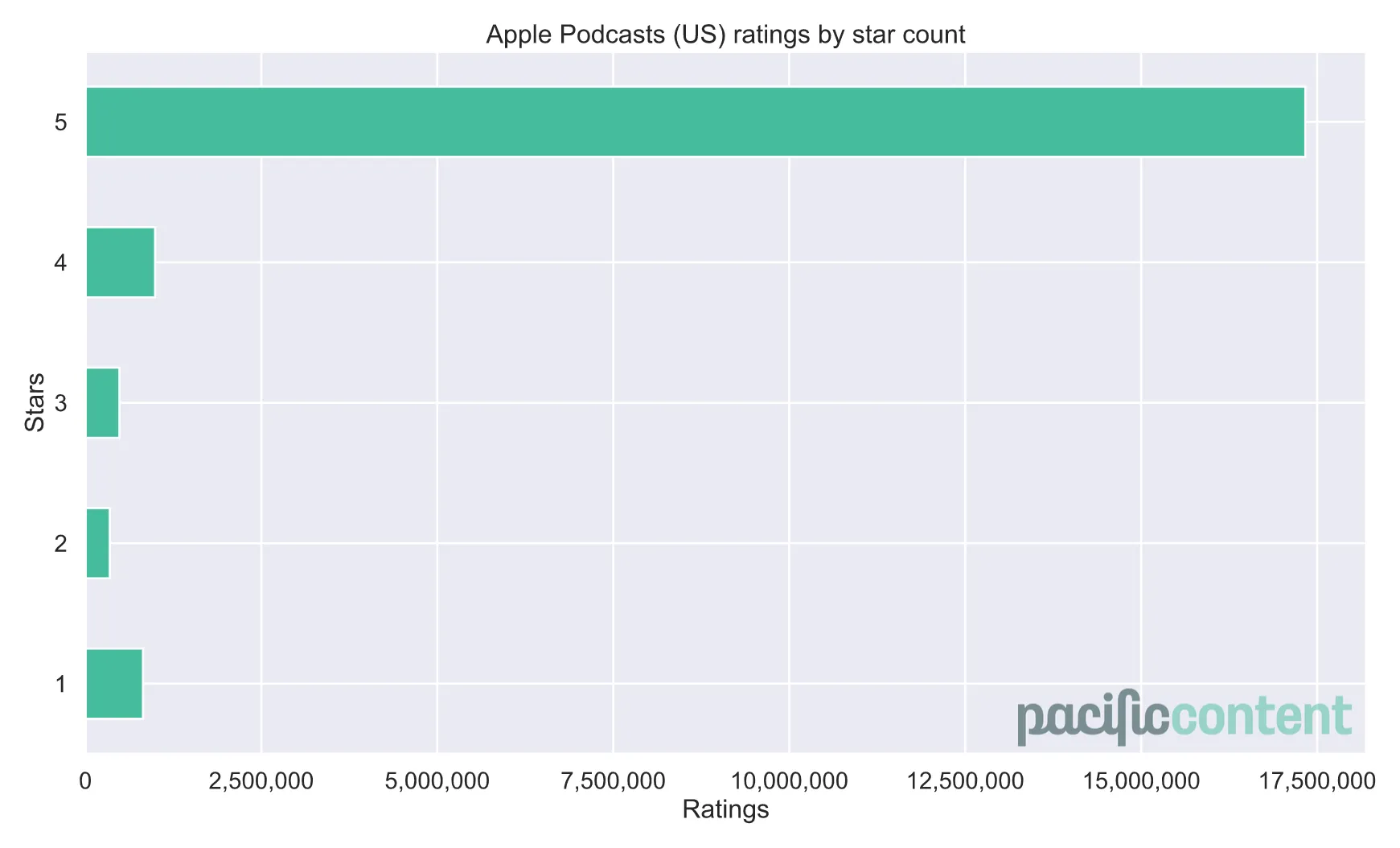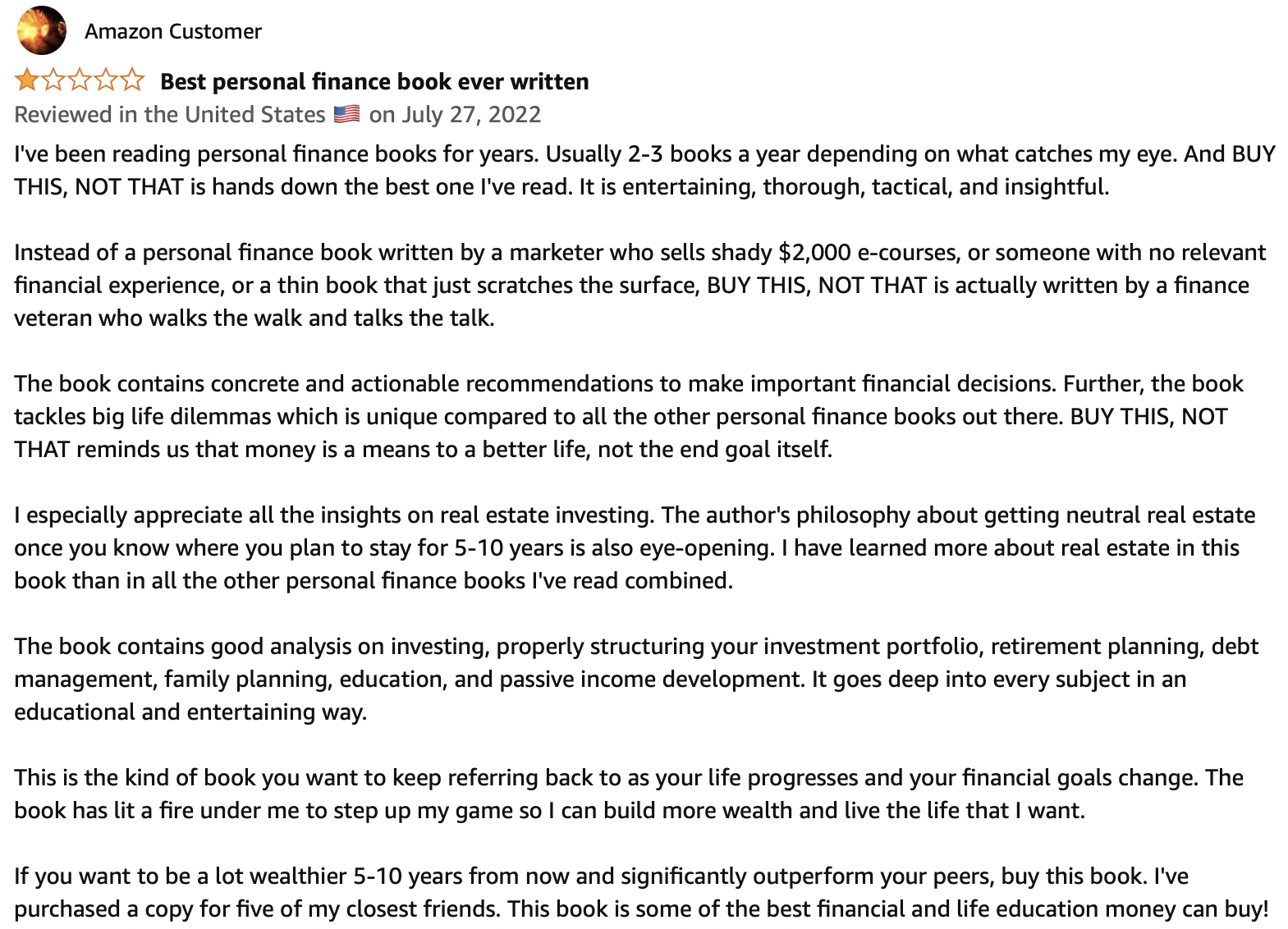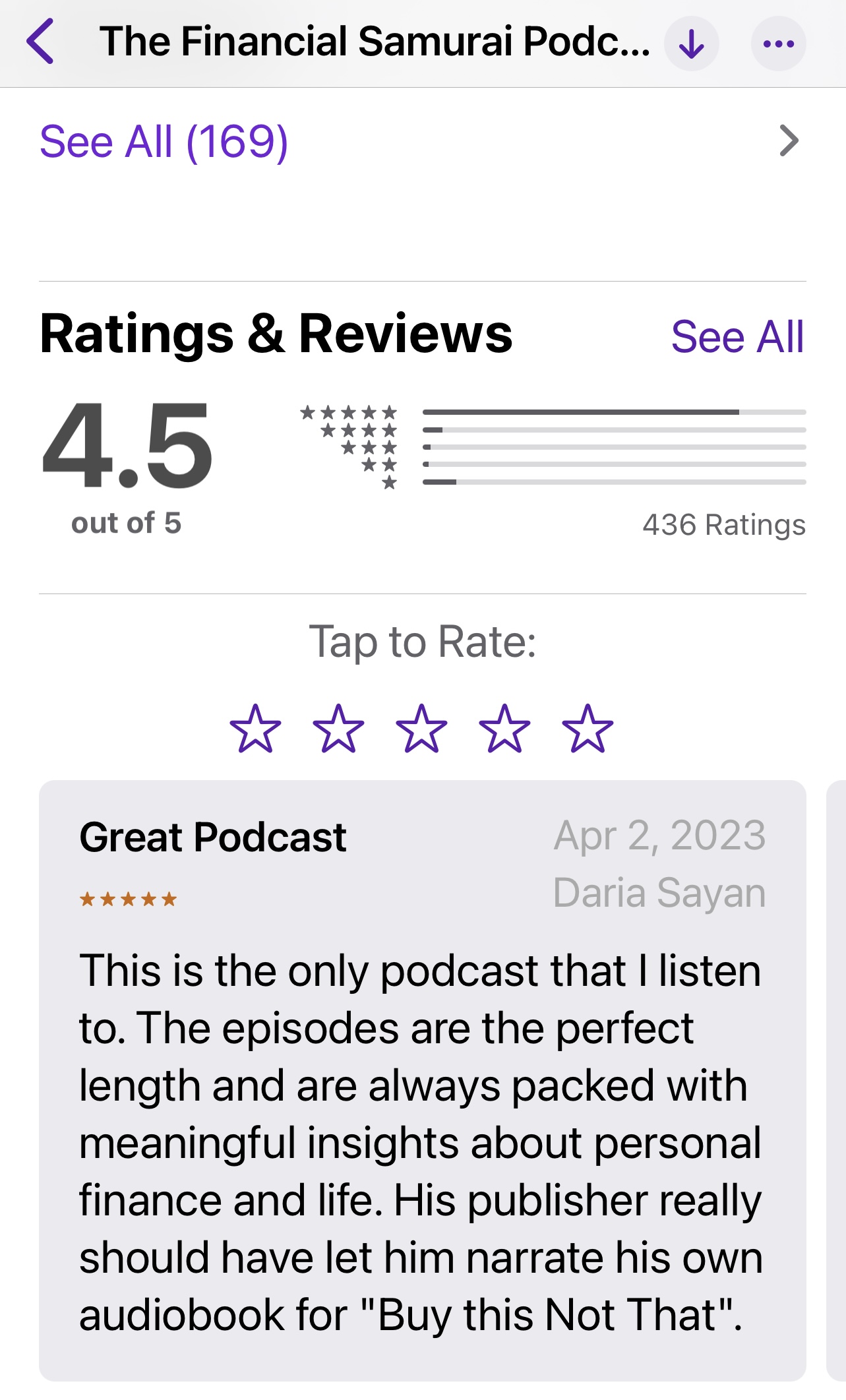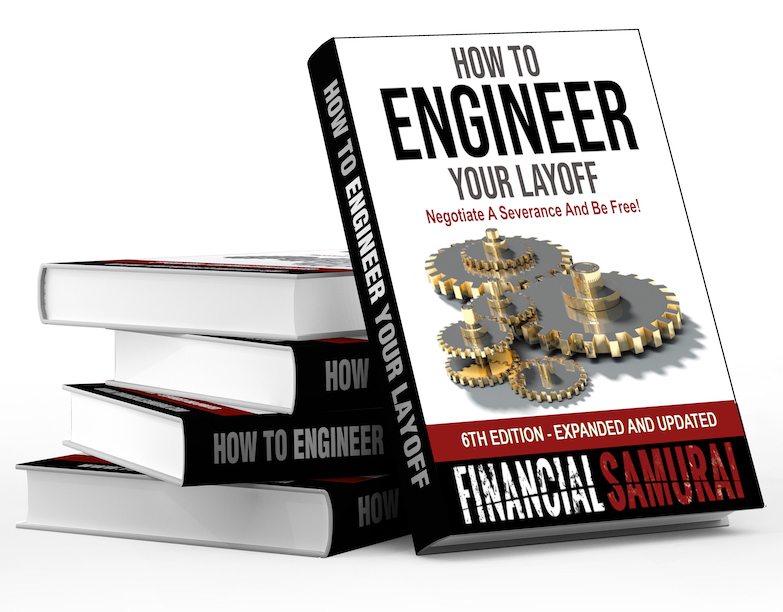One-star ratings can sting. But I’m here to encourage you to embrace all your critical feedback! One-star ratings can provide a significant boost to your podcast, book, video and whatever product you’re selling.
If you’re a podcaster, author, videographer, side hustler, or creator of any sort, you will inevitably get a one-star rating. When you first get one, you might get upset and forget about all the good four or five-star ratings you’ve received. You might even want to quit creating altogether.
But instead of quitting, I suggest you actively court one-star ratings to grow your work! If you do, you may end up making more money than you could ever imagine.
Let me explain why one-star ratings are great as a blogger since 2009, bestselling author since 2012, and a podcaster since 2017. Financial Samurai is one of the top personal finance podcasts today.
Why One-Star Ratings Are Great For Product Growth
Let’s say you have a podcast, book or video channel. Let me share why you want some one-star ratings.
Unlike eating at a restaurant, these types of online products are low-risk products because they are either free (podcast) or low cost (book). You won’t get diarrhea listening to a podcast, but you could if you eat at a bad restaurant!
1) One star ratings make your product look more authentic
You actually don’t want all five-star ratings. Instead, you’d rather have a mix of five-star, four-star, three-star, two-star, and one-star ratings. Products with all five-star ratings look fake because there’s no such thing as unanimous perfection.
Most people know the ratings system can be gamed. Some creators buy ratings. While most will simply ask their friends and family members for five stars.
But the real world isn’t perfect and your podcast, book, or video isn’t either. Studies have consistently shown that products with a mix of ratings look more authentic to listeners and readers. Therefore, there is a much higher click-through rate of purchasers.
Of the nearly 20 million Apple Podcasts ratings analyzed, the vast majority (87%) are 5-star ratings. As a result, 5-star ratings no longer stand out. What does stand out are 1-star ratings.

2) One-star ratings create more curiosity and interest from potential customers
Nobody has time to wade through 100+ five-star ratings. But people do have time to wade through the fewer one-star ratings. In general, people are fascinated by hate, conflict, and badmouthing. It’s why the media does so well when it pumps out divisive content.
Getting one-star ratings helps your product attract controversy, which in turn, generates more interest. For example, if your podcast gets feedback like, “The speaker is out of touch with reality,” that makes potential listeners more curious. What is the speaker so out of touch about? Let me listen!
Readers, watchers, and listeners love controversy. And once you get new clientele in, they can then decide for themselves watch they think about your work. They might agree with the one-star rater or they might think the one-star rater is full of it.
You might even get some positive one-star reviews! These are the best because they are often the most read. Here’s an example of a glowing one-star review on Amazon for my instant Wall Street Journal bestseller, Buy This, Not That: How To Spend Your Way To Wealth And Freedom.

3) One-star ratings provide good feedback to further improve your product
Sometimes creators get tunnel vision. Receiving a one-star rating is a great way to break out of your regular train of thought and see what you are potentially missing. Is the reviewer making a good point or is he just pissed because you said something he disagrees with?
The more feedback you can get from your reviewers, the better you can make your product. For example, my bestselling ebook, How To Engineer Your Layoff, is on its 6th edition. It has grown from about 160 pages to 250 pages, largely due to reader feedback.
Now the book is the best severance negotiation book today. It used to sell about $2,000 – $3,000 in copies a month when it didn’t have any one-star ratings. Now it regularly sells between $5,000 – $8,000 in copies a month, largely thanks to reader feedback.
If you’re interested in learning how to walk away from a terrible job with money in your pocket, use the code “saveten” to save $10. The average severance package amount is a lot. Please don’t quit your job and walk away from so much money!
4) One-star ratings create obsessed fans who spread the word through free PR
The people who will help you grow are the fans who give 5-star ratings and the haters who give 1-star ratings. The 5-star rating fans will tell their friends and loved ones about your work. They will be your evangelists.
Haters who give 1-star ratings will also tell their friends and loved ones (if they have any) about your work. They’ll share your newsletters, podcasts, and books to make fun of it. This is great because it brings even more exposure to your work. The stronger the hate, the more your work will spread.
It takes a very bitter person to spend time and life force to spread hate. But if your work can agitate a hater enough, they will continue to use their energy to make your work known to the world.
As all people in Public Relations know, bad PR is good PR. You want as many people talking about your podcast, book, and YouTube channel as possible. Then other people will consume your work and decide for themselves whether it stinks or not.
Because I share opinions on Financial Samurai, I attract some people who vehemently disagree with my beliefs. Some are called the Internet Retirement Police who judge me for how I live my post-work life. While others are simply internet trolls.
But partially thanks to their criticism, Financial Samurai has grown into one of the largest independently-owned personal finance sites today with over one million organic readers a month!
There are people who hate what I write, but can’t stop reading and badmouthing my work to their friends. I’ve very thankful for their criticism as without them, Financial Samurai wouldn’t have grown to its current size.
5) One-star ratings boost algorithms to show your work
Every algorithm from Amazon, Apple, to Google has various measures to decide whether it should feature a creator’s work. One of those variables is the number of ratings your product gets.
The more ratings your product gets, the more Amazon or Apple will show your work. Amazon regularly creates curated e-mails that send users “You might also be interested in this.” Amazon will also display related products based on your prior views and purchases.
One-star ratings are great for your ratings count, which is a big variable in helping your product get shown more. The best personal finance podcast is often shown by the algorithms given its variety of ratings.
Percentage Breakdown Of Podcasts With Different Ratings
There was one study of 1.2 million podcasts that showed about 850,000 have ZERO ratings! It’s because nobody is listening or cares.
As professor Randy Pausch said in The Last Lecture, “When you’re screwing up and nobody says anything to you anymore that means they’ve given up on you…you may not want to hear it but your critics are often the ones telling you they still love you and care about you and want to make you better.”
Getting a one-star rating means someone is listening and cares enough to promote your work.
When the data analyst removed the large number of shows with zero ratings, he was able to create useful quantile benchmarks. If your podcast has:
- 4 or more star ratings, you have more ratings than 50% of all shows
- 11 or more star ratings, you have more ratings than 75% of all shows
- 34 or more star ratings, you have more ratings than 90% of all shows
- 81 or more star ratings, you have more ratings than 95% of all shows
- 595 or more star ratings, you have more ratings than 99% of all shows
… where “all shows” means “all shows with one or more star ratings.”
Therefore, the more star ratings you can get on your podcast, the more the algorithms will display your work to new users.
6) One-star ratings help you optimize your time and energy
Finally, one-star ratings help you focus. You may think you’re great at something or think your product is God’s gift to the world, but one-star ratings will keep you honest. Suffering from Dunning-Kruger can ruin your life!
Receiving a one-star rating on my podcast is always great because it gives me permission to take a break from recording and reassess. Given I have full control over my time, it’s sometimes easy to get careless with how I spend my time.
Podcasting is a fun activity that generates only a small amount of revenue that you’ll see below. Instead, if I want to make more money, a one-star rating helps channel my energy towards more lucrative endeavors.
The Ideal Rating Distribution For Maximum Results
I hope you can feel better knowing that having some one-star and two-star ratings are great for your podcast, book, and other creative works. Embrace the criticism and hate. They are great for business!
Of course, you don’t want your product to have mostly one-star ratings. If so, your sales will decline. Instead, you want to have the ideal star rating breakdown to get maximum results. Here’s what you’d ideally like to have:
- Have at least 100 star ratings to build credibility.
- 70% – 80% 5-star ratings
- 10% – 20% 4-star ratings
- 5% – 10% 3-star ratings
- 2% – 5% 2-star ratings
- 5% – 15% 1-star ratings
Again, you want to have a diversified number of star ratings to signal your product is as authentic as possible. People have naturally learned to gravitate away from products that have all 4-star and 5-star ratings due to a better understanding of how people manipulate ratings.
In other words, try to shoot for one 1-star rating for every seven or eight 5-star ratings you receive. If you start getting more than thirty 5-star ratings without getting any 1-star ratings, consider changing things up.
Make your work more provocative, more opinionated, or more unique. You want to bring in the haters in order to boost your overall rating count and diversify your ratings.
The Dumbbell Ratings Approach To Get More Listeners, Readers, And Viewers
The above rating distribution is great for getting the maximum number of listeners, readers, and viewers. But you may also want to consider the odd dumbbell ratings approach. It consists of mostly 5-star and 1-star ratings.
Here is an example of a dumbbell ratings approach for The Financial Samurai Podcast, which generates tens of thousands of monthly downloads and has millions of downloads overall.
I’ve got a lot more 5-star ratings, but my 1-star ratings have surpassed my 4-star ratings and are now in second place. As a result, the growth of my podcast has accelerated as more people are curious to hear what I have to say.

My main goal is to get my podcast rating count to over 595. If I do, that means my podcast will have more ratings than 99% of all shows with one or more star ratings. If you’re going to do something, it’s worth trying to get into the top percent.
One-Star Ratings Ultimately Make You More Money
I hope all creators are more welcoming of their one-star ratings. The criticism may be unpleasant, but don’t get discouraged. The secret to your success is to keep on going! Appreciate the fact someone has taken the time to listen, read, or watch.
And if you really want to feel good about one-star ratings, know that they are helping you make money! Lot’s of it!
For example, thanks to one-star ratings for my podcast, I estimate I’m making at least $10,000 more a year. On the high side, I could be making as much as $25,000 more a year.
More critical feedback has made my severance negotiation book a perpetual bestseller that generates up to $70,000 more a year. Not bad.
Meanwhile, my traditionally published book on personal finance will likely become a mainstay classic thanks to diversified reviews. Given BTNT became an instant national bestseller, I was offered a two-book deal worth from Portfolio Penguin, one of the top publishers in the world.
Keep on creating Untemplaters! Treat every new one-star rating as motivation to continue. Your success will agitate even more of your haters, which will fuel your success even more!
For more nuanced personal finance content, join 60,000+ others and sign up for the free Financial Samurai newsletter. You can sign up for the Financial Samurai podcast on Apple or Spotify.
Financial Samurai is one of the largest independently-owned personal finance sites that started in 2009.

I check out the one star reviews to see what the reviewer had an issue with. If it’s something totally unrelated to the item being reviewed, or completely out of the control of the one being reviewed, I just ignore that one star review.
I do wonder what would make a reviewer give a two star review. It seems to me that people would either love it (leaving a five start review) or hate it (leaving a one star review).
Now, on a scale of 1 to 10, I will RARELY give a 10. Nobody’s perfect, right? So maybe I should give more four or three star reviews???
Oh man the 1-star reviews must be infuriating. Props to you for looking at the bright side of things. I can see how having some low reviews helps build authenticity and credibility though. If I only saw 5-star ratings on something with no 4s or 3s I’d definitely be skeptical. I never thought about what I would think if there were no 1s. But I can totally get how it would spark curiosity to see just what it was that sparked someone to rate poorly. And curiosity is definitely what creators want! Good call.
I’m not mad at all. I get pumped because it shows that people are listening and reading!
I really want to get my Podcast review count up. So based on the current math, I can’t afford another 30 or so one star or two star reviews.
But if my five star reviews keep on going up, I could afford more one-star reviews.